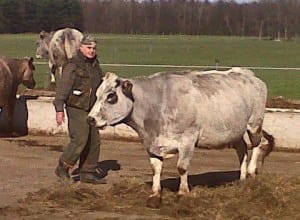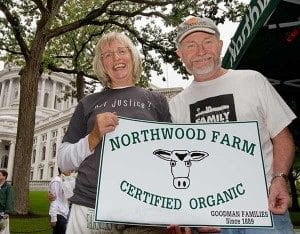[View Cornucopia’s legal complaint here.]
Watchdog: Business Executives Appointed to Seats Congress Reserved for Farmers
 |
Source: NEC Corp. of America |
The Cornucopia Institute has filed a lawsuit challenging the USDA’s appointment of non-farmers to positions reserved by Congress for organic farmers on the National Organic Standards Board (NOSB). The NOSB is a 15-member citizens’ board established by Congress to determine what synthetic materials are safe and appropriate for use in organic food and agriculture, and to provide advice to the USDA Secretary of Agriculture on organic policy.
Congress, in passing the Organic Foods Production Act (OFPA), reserved four positions on the NOSB for individuals who “own or operate” an organic farm. Other stakeholder interests, such as consumer, environmentalist and food processor, are also represented on the board. Cornucopia’s lawsuit alleges that two of the board’s four farmer positions are occupied by full-time agribusiness executives, rather than farmers.
The Institute for Public Representation at Georgetown University Law Center has filed the lawsuit on Cornucopia’s behalf. Two certified organic farmers joined Cornucopia in the lawsuit as plaintiffs. Both farmers applied for NOSB appointments and were passed over by the USDA in favor of the agribusiness executives.
As the organic industry has grown into an almost $40 billion a year market, major agribusinesses such as Smuckers, Kellogg’s, General Mills and Dean Foods (WhiteWave) have purchased many of the leading national organic brands and, through their trade-lobby group, the Organic Trade Association, are wielding, according to Cornucopia, undue influence at the USDA.
“This type of appointment is part of a pattern of actions taken by the USDA to make the NOSB and the National Organic Program friendlier to the needs of big business interests,” said Will Fantle, Cornucopia’s Codirector. “Not only are farmers being denied their voice and right to participate in organic decision-making, but statistics illustrate the corporate representatives sitting in farmer seats have been decisively more willing to vote for the use of questionable and controversial materials in organics, weakening the organic standards.”
Cornucopia, an organic industry watchdog, has been tracking votes taken by the NOSB for several years and has documented a clear and systematic difference in voting between the real farmers on the board and the agribusiness executives. You can view the updated NOSB voting scorecard here.
 “I have applied three times over the years for one of the four seats reserved by Congress for organic farmers on the NOSB,” said Dominic Marchese, a certified organic grass-based beef farmer from Ferndale, Ohio and one of the farmer-plaintiffs on the lawsuit. “I am angry at how anyone at the USDA thinks that an agribusiness executive can represent my decades of experience working with the land and animals,” Marchese, one of the farmer plaintiffs, added.
“I have applied three times over the years for one of the four seats reserved by Congress for organic farmers on the NOSB,” said Dominic Marchese, a certified organic grass-based beef farmer from Ferndale, Ohio and one of the farmer-plaintiffs on the lawsuit. “I am angry at how anyone at the USDA thinks that an agribusiness executive can represent my decades of experience working with the land and animals,” Marchese, one of the farmer plaintiffs, added.
Marchese last applied for the NOSB in 2011, the year that Carmela Beck was appointed to a farmer seat. Ms. Beck works for the giant berry producer Driscoll’s as a “grower liaison” coordinating relations with Driscoll’s contract berry growers. The company itself does not grow any of its organic fruit.
 Rebecca Goodman, a certified organic dairy farmer from Wonewoc, Wisconsin applied for the NOSB in 2014. That year the USDA appointed Ashley Swaffar to the board. At the time, Ms. Swaffar was a corporate compliance officer at the Arkansas Egg Company (she was later a staff member of another agribusiness, Vital Farms, but left there in April 2016). Ms. Goodman is also a plaintiff in the lawsuit.
Rebecca Goodman, a certified organic dairy farmer from Wonewoc, Wisconsin applied for the NOSB in 2014. That year the USDA appointed Ashley Swaffar to the board. At the time, Ms. Swaffar was a corporate compliance officer at the Arkansas Egg Company (she was later a staff member of another agribusiness, Vital Farms, but left there in April 2016). Ms. Goodman is also a plaintiff in the lawsuit.
Cornucopia has filed Freedom of Information Act (FOIA) requests with the USDA to obtain a full record of applicants to the NOSB during the years that these appointments were made. “We know from our FOIA requests that there were many other certified organic farmers who had applied and were also rejected by the USDA in favor of agribusiness interests,” said Fantle.
According to Cornucopia the FOIA documents the organization secured, which included the applications for Driscoll’s Beck and Vital Farms’ Swaffar, did not contain any reference or documentation indicating that either individual owned or managed an organic farming operation.
Fantle also noted that Cornucopia has, for years, requested that the USDA open up the NOSB application process and reveal the names of all applicants prior to making appointment decisions. This would allow for input from the full organic community to help the Secretary select the best and brightest before appointments are made. “Instead,” Fantle observed, “they have chosen to conduct this process in secret. These apparently illegal appointments might not have occurred had the USDA elected to conduct a more transparent process.”
Using the Cornucopia Institute’s NOSB voting scorecard, when compared to the policy positions of the preponderance of nonprofit, public interest groups monitoring the organic program, Ms. Swaffar and Ms. Beck had scores, respectively, of 31% and 10%. Their ratings are in stark comparison to outgoing NOSB member Colehour Bondera, a legitimate certified organic farmer from Hawaii, whose lifetime voting score was 92%.
Former NOSB member Goldie Caughlan, of Seattle, Washington, recalls how important it was to have a board that accurately represented organic stakeholders. “When I served on the NOSB from 2001 to 2006 in a consumer seat, I needed to hear what the board’s organic farmers were saying to help me make the best decisions, Caughlan said. “Depriving the board of the voice of real farmers damages organics and cheats organic stakeholders.”
Management of the USDA’s National Organic Program is embroiled in a number of other current lawsuits. One court challenge involves the agency’s unilateral changes to the congressionally mandated “Sunset” process easing reapproval, every five years, for synthetic and non-organic materials currently used in organics. Another lawsuit concerns the USDA’s lax oversight of potential contaminants in compost from non-organic operations.
The new lawsuit also covers a number of other issues pertaining to OFPA and the Federal Advisory Committee Act where Cornucopia alleges the USDA has illegally hijacked the public-private partnership that Congress designed to govern the organic industry.
These additional allegations in the lawsuit include disbanding the Board’s Policy Development Subcommittee, thus stripping the body of the ability to develop its own governance.
“The NOSB was designed by Congress to placate the concerns of the organic community, to act as a buffer between organic industry regulation and the power of corporate agribusiness lobbyists,” said Cornucopia’s senior farm policy analyst, Mark A. Kastel. “Stripping the board of the ability to set its own work plans and agenda shuts out the public that has historically petitioned for the attention of the NOSB to focus on industry-wide problems.”
“We have grown disillusioned with the operation of the National Organic Program,” says Cornucopia’s Fantle. “We had high hopes when Miles McEvoy was originally appointed to this role in 2009, and praised his selection. But the corporate friendly approach and lax enforcement activities have led us to call for new management.”
Cornucopia continues to gather individually signed letters from organic stakeholders calling for new management at the USDA’s National Organic Program. Fantle said the organic industry watchdog group has already collected more than 4,000 letters and will be sending an additional batch to USDA Secretary Thomas Vilsack soon.
MORE:
“Cornucopia would have absolutely no objections whatsoever, legal or otherwise, if Ms. Beck and Ms. Swaffar chose to resign from the NOSB and reapply in a seat designated, by Congress, for an organic handler (processor). That’s a role they would be legally qualified for,” said Fantle. “Our lawsuit is not against these two individuals but rather the USDA Secretary for having violated the clear intent of the Organic Foods Production Act by stacking the board so that votes favor corporate agribusiness.”
Cornucopia has pointed out that although some of the other appointments do not violate the letter of the law, the history of the USDA appointing industry operatives to sit on seats that Congress clearly earmarked for independent organic stakeholders certainly violates the spirit and intent of Congress.
“At one point, several years ago, the USDA appointed an employee of General Mills to sit in one of the seats representing consumers. There was so much blowback at the time that her name was withdrawn and she later was reappointed in the “scientist” seat,” Fantle added.
“I am sure that when Congress decided to set aside a seat for someone with a background in the biological sciences that they weren’t figuring on adding an additional agribusiness representative to the board, skewing votes in favor of adding synthetic materials and ‘factory farm’ organic production,” said Fantle.
Major points alleging a power grab by the USDA from the lawsuit include:
- USDA arbitrarily disbanding the NOSB’s Policy Development Subcommittee, removing the historic mechanism by which the NOSB governed its own activities and conduct, such as resolving conflict of interests.
- USDA National Organic Program director self-appointing as co-chair of the NOSB — OFPA explicitly gives the power to elect the chair to the NOSB, not USDA bureaucrats.
- USDA removing the power of the NOSB to establish its own work plan and agenda, undermining the NOSB’s independence. Throughout its 20 year history the organic community has repeatedly petitioned the NOSB to address serious concerns. Cornucopia alleges that the USDA power grab puts bureaucrats, political appointees and lobbyists in charge of organic regulation.
- Appointing non-farmers illegally occupying NOSB seats specifically earmarked, by Congress, to be held by organic farmers.
- Binding obligations on USDA to maintain the NOSB composition balance as prescribed by OFPA.
The spring meeting of the National Organic Standards Board takes place in Washington, D.C. beginning on Monday, April 25. One of the most controversial issues before the panel is a proposed wholesale rewrite of the Policy and Procedure Manual (PPM), the framework for the operation of the NOSB.
The proposal has created a great deal of consternation in the organic community due to the fact that the USDA took the authority away from the NOSB to draft their own rules, undermining much of their independence and power, and is now asking the industry-friendly board to institutionalize its “power grab.”
For full background on the controversy surrounding the PPM visit:
https://www.cornucopia.org/2016/04/shifting-authority-away-national-organic-standards-board/

